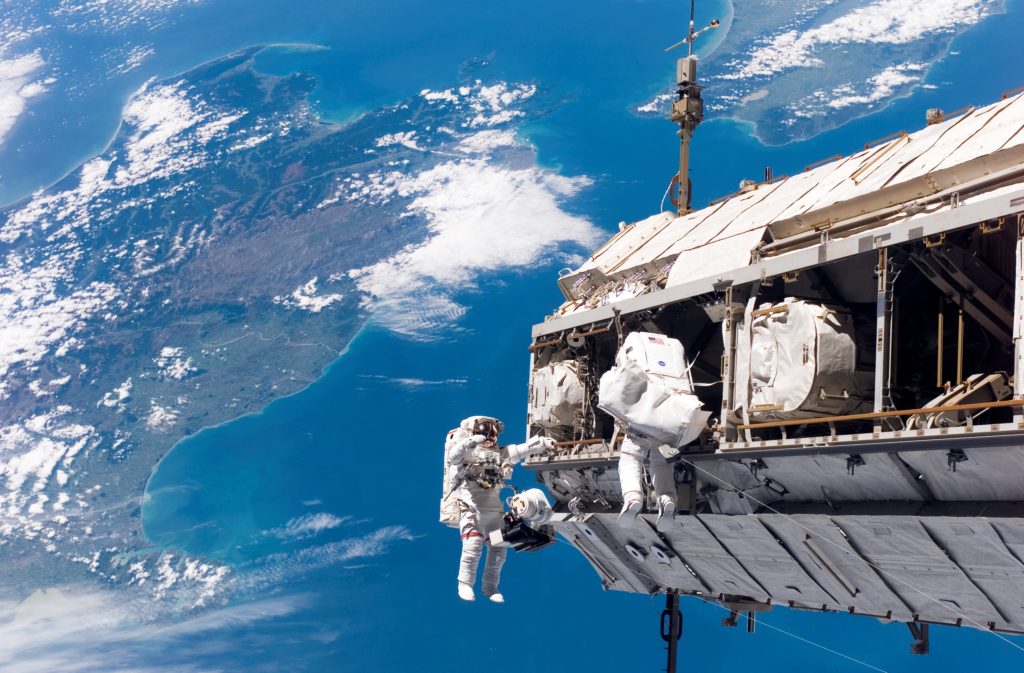
Hallie Trial
Rice University
Houston (29.7° N, 95.3° W)
Humans were never meant to live in space. In microgravity, lack of mechanical stress on the body leads astronauts’ bones to dissolve, and smaller loads on astronauts’ muscles cause muscular atrophy. Radiation exposure outside the protective blanket of Earth’s atmosphere not only damages astronauts’ DNA, but it also suppresses their immune system, which makes ordinary illnesses more dangerous. Astronauts must not only face these extraordinary dangers but do so out of the reach of normal healthcare personnel and equipment. Space medicine is a growing field that addresses these health concerns.
Because of the enormous cost of sending people into space, astronauts cannot have a full medical team onboard to treat problems that arise. Therefore, before the mission begins, physicians called flight surgeons teach their assigned crew how to perform the basic medical procedures they might need. Flight surgeons also meticulously examine the health of each crewmember to ensure that they have no preexisting conditions that could endanger them during the mission. In this way, space medicine focuses much more heavily on prevention of illness than does ordinary medicine. As Emmanuel Urquieta Ordonez, a scientist at the Translational Research Institute for Space Health, pointed out in an interview for Longitude.site, “Aerospace medicine deals with very healthy people, and we prevent them from getting sick from the physiological changes that they experience during space flight… traditional medicine deals with sick patients, and you bring them back to health.”
Space medicine presents unique challenges in other ways, too. Unlike ordinary physicians, flight surgeons cannot directly talk to and touch their patients to come up with a diagnosis. In an interview published on Healthcare IT News, Shannan Moynihan, Deputy Chief of Space and Occupational Medicine at the Johnson Space Center, said that once the crew launches, “Our ability to communicate with and examine our patients is limited to audio and video communication via telemedicine.” During a mission, flight surgeons work in the Mission Control Center in case the astronauts need to contact them for a medical concern or emergency and hold weekly medical conference calls with the crew. Flight surgeons must also meet their space-going patients at the landing site, sometimes in far-flung locations, to help them readjust to Earth’s gravity.
In addition to flight surgeons, organizations like NASA need medically-trained administrators with an understanding of aerospace science to minimize the medical risk both astronauts and ground crews experience. J.D. Polk, NASA’s Chief Health and Medical Officer, explained that he oversees “the technical requirements that impact the astronauts’ health, such as how a vehicle will be built, whether radiation can be mitigated, how much exercise a crew can do on board, and their food and water needs during a mission,” in an interview for The DO.
Another path into space medicine is through medical research. Our understanding of how microgravity affects human physiology is still “in its infancy,” according to Shannan Moynihan at the 2019 Owls in Space Symposium. For longer space trips like the planned 2030 Mars mission to become a reality, we must advance our knowledge of how the environment of space impacts human health and develop new ways to mitigate those health risks. Emmanuel Urquieta and other scientists at the Translational Research Institute for Space Health contribute to this goal through a huge variety of projects. Some investigate which genes hardy microscopic organisms like tardigrades use to protect themselves from radiation in hopes of finding ways to make similar genes in humans work in such a way. Others are “trying to find out artificial intelligence and machine learning techniques to not just diagnose but to predict when a medical condition is going to happen,” said Urquieta. Such techniques will prove necessary for deep space explorations like the 2030 mission to Mars because traveling greater distances means greater communication delays with flight surgeons, making the crew’s ability to deal with medical emergencies using technology on hand even more vital.
Space medicine researchers can gain qualifications for their positions through PhD programs or combined MD/PhD programs. Aspiring flight surgeons must earn certification in aerospace medicine from the American Board of Preventive Medicine by completing an aerospace medicine residency and required graduate coursework. Besides certification, most successful flight surgeons have an extensive breadth of medical knowledge because they must diagnose and treat any health issue that emerges in orbit, from ordinary stomach complaints to emergencies like decompression sickness that could arise during a spacewalk.
Humans were never meant to live in space. And yet, we do. Despite the incredible technical, medical, and financial challenges in our way, we continue to reach out into the universe around us, ever driven to push back the frontier of the unknown. The limitations of our own bodies now pose some of the greatest barriers to advancement. As space medicine conquers these challenges, the deep space exploration humankind has dreamt of for generations may someday become reality.

Other suggested resources
An article about space medicine, including descriptions of individuals’ careers and information about opportunities for building a career in the field.
https://www.aamc.org/newsroom/newsreleases/469122/space_medicine_09072016.html
An interview with J.D. Polk, NASA’s Chief Health and Medical Officer, about his experiences in space medicine.
https://thedo.osteopathic.org/2016/12/nasas-top-doc-do-oversees-the-health-of-astronauts-preps-for-mars-mission/
Information about residency programs in aerospace medicine and the requirements for becoming an aerospace physician.
https://www.asma.org/about-asma/careers/aerospace-medicine/residency-programs-related-courses
An interview with Shannan Moynihan, Deputy Chief of Space and Occupational Medicine at the Johnson Space Center, about her career path and experiences in aerospace medicine.
https://www.healthcareit.com.au/article/out-world-medicine-meet-doctor-managing-astronaut-healthcare
A summary of the qualifications and duties of flight surgeons at NASA.
https://www.nasa.gov/content/flight-surgeons
